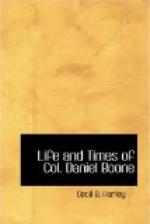“The dignity of history is not lowered by this enumeration of the pre-eminent qualities of Indian corn. The rifle and the axe have had their influence in subduing the wilderness to the purposes of civilization, and they deserve their eulogists and trumpeters. Let paeans be sung all over the mighty West to Indian corn—without it, the West would have still been a wilderness. Was the frontier suddenly invaded? Without commissary or quartermaster, or other sources of supply, each soldier parched a peck of corn; a portion of it was put into his pockets, the remainder in his wallet, and, throwing it upon his saddle, with his rifle on his shoulder, he was ready, in half an hour, for the campaign. Did a flood of emigration inundate the frontier with an amount of consumers disproportioned to the supply of grain? The facility of raising the Indian corn, and its early maturity, gave promise and guaranty that the scarcity would be temporary and tolerable. Did the safety of the frontier demand the services of every adult militiaman? The boys and women could, themselves, raise corn and furnish ample supplies of bread. The crop could be gathered next year. Did an autumnal intermittent confine the whole family or the entire population to the sick bed? This certain concomitant of the clearing, and cultivating the new soil, mercifully withholds its paroxysms till the crop of corn is made. It requires no further labor or care afterward. Paeans, say we, and a temple and worshipers, to the Creator of Indian corn. The frontier man could gratefully say: ’He maketh me to lie down in green pastures. He leadeth me beside the still waters. Thou preparest a table before me in presence of mine enemies.’
“The sports of the frontier men were manly, athletic, or warlike—the chase, the bear hunt, the deer drive, shooting at the target, throwing the tomahawk, jumping, boxing and wrestling, foot and horse-racing. Playing marbles and pitching dollars, cards and backgammon, were little known, and were considered base or effeminate. The bugle, the violin, the fife and drum, furnished all the musical entertainments. These were much used and passionately admired. Weddings, military trainings, house-raisings, chopping frolics, were often followed with the fiddle, and dancing, and rural sports.”




